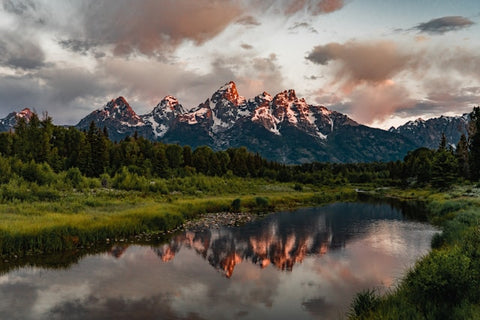Photography Hikes: Grand Teton National Park

A landscape rich with majestic vistas, beautiful lakes, awe-inspiring mountains, and amazing wildlife, it’s hard for photographers to find anything better than the Grand Teton National Park. Located in northwestern Wyoming, this is essentially 310,000 acres of natural paradise, with plenty of hiking trails that can test both your fitness and abilities with the camera.
Whether you want to fill your next Instagram photo book or you’re just looking for a single, showstopping photograph that demonstrates your skills, we’re going to take you through the best hiking trail and tell you exactly what you should look out for when you’re there.
The Hiking Trail: Grand Teton National Park
The best-rated hiking trail in Grand Teton National Park is the Cascade Canyon Trail, which is rated 4.8 on TripAdvisor. Stretching for 13.3 miles with a 1,720 ft elevation, this is the best way to see some of the most beautiful spots in the park, complete with the Hidden Falls and the infamous Inspiration Point.
Why It’s Good
Any trail that takes you to Inspiration Point is automatically great. From here, you will have stunning views of the entire park, including Mount Owen, Jenny Lake, Teewinot, and the Grand Teton. It’s also one of those trails that just gets better the further you walk.
Starting off walking through a gorgeous conifer forest, you quickly upgrade to the Hidden Falls – an incredible 100 feet high waterfall powered by snowmelt – then to Inspiration Point, and finally to the Forks of Cascade Canyon, where you either have the chance to continue the hike to Lake Solitude, or turn around for a totally different view of Jackson Hole valley.
What to Look Out For
Plenty of photographers come to Grand Teton National Park just for the wildlife, and it’s fair to say, there’s a lot to capture. Here are just a few of the wide variety of animals that you can spot while hiking:
- Pikas
- Badgers
- Moose
- Bison
- Coyotes
- Foxes
- Wolves
- Bears
- Elk
- Hawks
- Bald Eagles
- Trumpeter Swans
- Pelicans
Photography Tips
While hiking the Cascade Canyon Trail, it’s important to remember that you’re surrounded by mountains, so there are a few things you have to do to get your photography right.
-
Don’t Ruin the Scene
Some of the most gorgeous Grand Teton shots occur after a snowfall, where perfect snowy fields spread out into the vista. We can’t tell you how many photographs we’ve seen, however, where the scene has been ruined by boots that have already traipsed through the snow in exploration. If you’re looking for perfect snowy pictures to upload to our photo book maker, we’d recommend you think in advance and take the shots before you disturb the landscape!
-
Keep Yourself Powered
Another common mistake that photographers make is failing to bring a backup portable charger for their phones. While the trail in Grand Teton isn’t too long, the temperature can get pretty cold, which means your battery will drain much faster than usual. Even if you have a DSLR camera, it’s important to keep the batteries warm and bring backup chargers to avoid falling short.
Photography Challenges
We mentioned before that there’s a lot to see on this trail, so we can’t possibly go through all of the potential photo opportunities. That being said, we can give you a few challenges to ensure you test yourself and come away with something truly special.
-
The Hidden Falls
The Hidden Falls is one of the most popular waterfalls in Wyoming, and it’s one you’ll come across early in the trail. But rather than simply observing it and taking the picture, we’d ask you to go the extra mile to really communicate the beauty of the scene. Fast shutter speeds, for instance, only work to freeze running water, which only leaves you with an ordinary, uninspiring picture. If you slow your shutter speed all the way down to 0.5, you can smooth out the water and make it look far more silky and appealing to the eye.
-
Mount Owen
Mount Owen is an awesome thing to capture at any time of the day, sure, but we’d recommend capturing it during either sunrise or sunset – especially if you’re photographing during the spring, when they tend to be more colourful and harsh. If you’re lucky and the sky is clear, the tip of the mountain is often illuminated in pink, creating a beautiful juxtaposition between the white snow, the dark landscapes, and the deep blue sky. It’s a tricky picture to get, and it demands patience. But if you can’t be patient as a photographer, you’re unlikely to stick with this hobby for very long!





